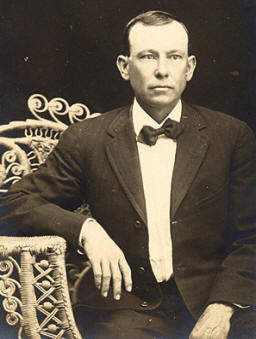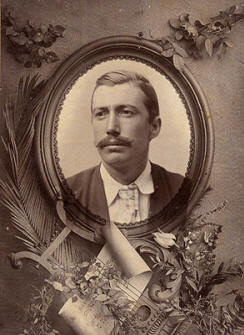|
GEORGE RAYMOND BROWN FAMILY |
|
 George Raymond Brown |
 The Von Braun Family of Bavaria Germany |
|
Written by May Smith c 1985
After his marriage he moved to Matagorda County. During his first years in Matagorda County, he lived in Pledger, Texas and served as Matagorda County Commissioner. He served in this office and was also Postmaster in Pledger while living there, when Matagorda, Texas was still the county seat. After his term expired he bought 200 acres of land in Sugar Valley from Dr. J. W. Brown (no relation). They built their home under the large oak trees just across county road 1728 from where Walter Brown's home is located. Mr. Brown's grandson, W. A. Brown, son of Walter and Reba Brown, has his home there now. The land is along Caney Creek, which had received its name from the endless cane brakes along the creek. It was here that he began his life as an American citizen in 1896.
Mr. and Mrs. G. R. Brown had six children: Theodore Brown, born June 25, 1873; Raymond Brown, born July 18, 1875; Beulah Brown born November 1, 1878; Lizzie Brown, born August 25, 1881; Walter Alfred Brown, born June 2, 1884; and Mary Brown, born March 3, 1888.
Mr. G. R. Brown, Sr. was an architect and worked for Anderson Clayton cotton company for a number of years. He was an inventor and obtained a patent for several inventions, among them being a press for round bales of cotton, made like a roll of paper; a percentage scale and a poison for leaf worms on cotton.
Mr. Brown and his eldest son, Theodore, began collecting machinery with the hope of opening a sugar syrup mill. The brick for the buildings came from the Bouldin plantation on Caney Creek just left of the "S" curve between Sugar Valley and Van Vleck on State Highway 35. By 1904 the mill was ready for operation. The mill had been in operation only a few years when in 1909 Matagorda County's worst hurricane in history destroyed the brick building housing the mill's machinery. The mill was repaired and was again in operation .
The cane used for the processing of the sugar was grown in the immediate area and on other plantations. Mr. Brown named his place "Sugar Valley." All of the cane was harvested by hand by field hands who used a cane knife with a 20-inch long blade. The blade had a hook on the end to hold cane so the harvesters would not have to stoop.
After the syrup was made it was put in one gallon, one-half gallon and five gallon containers. For one order the syrup was run into a railroad tank car. The syrup was shipped by rail from Sugar Valley to towns in North Texas.
Syrup sold by the tank car was bought for 21 cents per gallon wholesale. Near the close of the mill, syrup had risen in price to $1.50 per gallon.
The mill continued to operate until 1922. There were two causes for closing the mill: first, the cane borers which destroyed the crops; and second, the death of Mr. Brown. The mill was in operation for about twenty years and was profitable because of its location. The machinery and buildings were sold in 1922. There was no trace remaining but the memories in the minds of those who lived in the Sugar Valley area.
The mill was located on FM 1728 twelve miles northeast of Bay City and five miles from Van Vleck. It was the known as "cane run."
Mr. George Raymond Brown died November 25, 1915. Mrs. Mary Ellen McWilliams Brown, his wife, passed away January 1, 1932.
Mr. George Raymond Brown's family were well to do, well educated and were connected with the government in Germany. His family lost everything during World War I.
(Information for this article was furnished by
Mr. Brown's granddaughter, Margery May Brown Noster, of Bay City,
Texas and his grandson, Jack Odell Brown, of Sugar Valley. Most of
the information came from letters, papers and the family Bible.
Other sources include The New Encyclopedia of Texas, 1936,
page 1665 and a signed interview with Margery Brown Noster on August
17, 1984.) |
|
 Raymond Brown |
 Theodore Brown |
| Two sons of George Raymond Brown who worked with him at the mill. | |
|
Walter Alfred Brown Family |
|